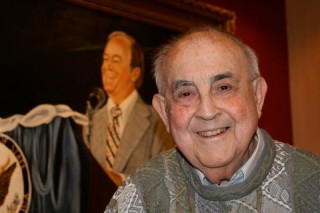 We throw “giant” around too much, but Minnesota really did lose a giant today when it was announced that Hy Berman has died at age 90.
We throw “giant” around too much, but Minnesota really did lose a giant today when it was announced that Hy Berman has died at age 90.
The history professor at the University of Minnesota was so much more. He was a political commentator, he was a frequent guest on radio and TV, he was the first witness for tobacco companies in the state’s 1998 tobacco trial in which he provided a history lesson on the warnings of the health impact of tobacco.
That didn’t help his popularity much, perhaps, but he said he learned when he was pushed around by “the super patriots” in his youth, that everyone deserved an adequate defense.
He was also a master storyteller, as when he told Dan Olson about the time a “reign of terror” wiped out civil liberties in Minnesota, or his Twin Cities Public Television story about the lost Rondo neighborhood of St. Paul.
But he was most entertaining and informative when he told his stories of Hy Berman, as he did in December 2008 on MPR’s short-lived In the Loop story slam. There was a fair amount of “entertainer” in Berman, too.
In 1998, he told his story to MPR’s Gary Eichten. Berman was the son of Polish immigrants who wanted to give their son a better life. When he started kindergarten in New York, he couldn’t speak English.
“All my classmates were that way,” he recalled.
“We were bilingual,” he said. “In school it was all English. At home it was all Yiddish.”
He said being a history professor “was the last thing I wanted to be.” His first contact with American history was “this super patriotic clap trap,” he said. “George Washington cut down the cherry tree. So what? Even at the tender age of 11 or 12, I knew there was something wrong with that.”
He thought he might become a scientist, but he switched at City College of New York in his junior year. “I found there was little creativity in chemistry,” Berman told Eichten.
World War II was on and the future of the nation was “roiling in the intellectual atmosphere of City College and I was caught up in that.”
He said he wasn’t a conventional historian, attempting instead to “translate the best and most accurate historical knowledge regarding the state, the nation, the society for the public at large as a public historian.”
“I think I’ve been reasonably successful in that,” he concluded.
(h/t: Margaret Bresnahan)
Hy Berman at his 90th birthday. Historian extraordinaire. Loved him, enjoyed working with him. #tptalmanac @tpt pic.twitter.com/bGuK8vVC5Q
— Mary Lahammer (@mlahammer) November 30, 2015
Our thoughts today w/family & friends of Prof. Hy Berman who passed at 90. @tpt clip of Hy doing what he loved: https://t.co/dmoHL8qV7F
— Almanac (@tptAlmanac) November 30, 2015
Hy Berman's voice is exactly what is needed in today's political discussion. Sad to see him go. https://t.co/KjdEutJxqc #UMNproud
— Thomas Trehus (@Trehus) November 30, 2015
